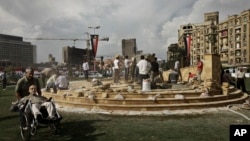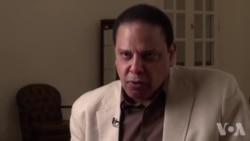CAIRO —
Tuesday is the anniversary of violent clashes between security forces and protesters near Cairo's Tahrir Square, and opposition groups plan to mark the day with more protests.
The observances on Mohamed Mahmoud Street, just off the square, come as the government Monday unveiled the base of a monument on Tahrir itself.
Late Monday, just hours after Egyptian officials held the dedication ceremony for the Tahrir Square monument, hundreds of protesters gathered at the site and defaced the structure with anti-military, anti-government and anti-Muslim Brotherhood graffiti.
The memorial, which at present consists only of its base, is intended to honor those killed in the mass protests that brought down two Egyptian presidents - Hosni Mubarak in 2011 and Mohamed Morsi earlier this year.
Some on Tahrir welcomed the renovation of the central Cairo plaza, worn down by nearly three years as a focal point of protest, anger and violence, expressing hope that it can symbolize a new era of stability.
But others find galling the symbolism of a military-backed government appearing to claim ownership of a square where hundreds of Egyptians were killed by security forces.
Anger on all sides
One writer on Twitter called it “not a memorial. It is a tombstone".
While pro-democracy advocates are furious about the Tahrir monument, supporters of Morsi's ousted Islamist government are equally angry about a new statue erected in Cairo's Rabaa Square. Hundreds of Morsi backers were killed when security forces moved on a protest camp there in August, resulting in what Human Rights Watch called the worst unlawful mass killings in Egypt's modern history.
The abstract Rabaa sculpture represents security forces and police protecting the Egyptian people.
Calls for answers
There have been few investigations of the violence that has wracked the nation in recent years. Mubarak's trial for his role in the 2011 killings is ongoing, while Morsi is just now seeing proceedings against him for the death of protesters outside the presidential palace last year.
But answers are few about the role of security forces, radicals and paid gangs who took part in the killings, including the Mohamed Mahmoud Street killings being marked Tuesday.
One of the nation's leading intellectuals, novelist Alaa al Aswany, says investigation is key. Before the deeply polarized nation can reconcile, he argues, there must be transitional justice. “You have victims on both sides, and accordingly,” he adds,”you cannot suddenly say, 'Look guys, we must be friends.'”
Video: Alaa al Aswany
The observances on Mohamed Mahmoud Street, just off the square, come as the government Monday unveiled the base of a monument on Tahrir itself.
Late Monday, just hours after Egyptian officials held the dedication ceremony for the Tahrir Square monument, hundreds of protesters gathered at the site and defaced the structure with anti-military, anti-government and anti-Muslim Brotherhood graffiti.
The memorial, which at present consists only of its base, is intended to honor those killed in the mass protests that brought down two Egyptian presidents - Hosni Mubarak in 2011 and Mohamed Morsi earlier this year.
Some on Tahrir welcomed the renovation of the central Cairo plaza, worn down by nearly three years as a focal point of protest, anger and violence, expressing hope that it can symbolize a new era of stability.
But others find galling the symbolism of a military-backed government appearing to claim ownership of a square where hundreds of Egyptians were killed by security forces.
Anger on all sides
One writer on Twitter called it “not a memorial. It is a tombstone".
We are sorry, but this feature is currently not available
While pro-democracy advocates are furious about the Tahrir monument, supporters of Morsi's ousted Islamist government are equally angry about a new statue erected in Cairo's Rabaa Square. Hundreds of Morsi backers were killed when security forces moved on a protest camp there in August, resulting in what Human Rights Watch called the worst unlawful mass killings in Egypt's modern history.
The abstract Rabaa sculpture represents security forces and police protecting the Egyptian people.
Calls for answers
There have been few investigations of the violence that has wracked the nation in recent years. Mubarak's trial for his role in the 2011 killings is ongoing, while Morsi is just now seeing proceedings against him for the death of protesters outside the presidential palace last year.
But answers are few about the role of security forces, radicals and paid gangs who took part in the killings, including the Mohamed Mahmoud Street killings being marked Tuesday.
One of the nation's leading intellectuals, novelist Alaa al Aswany, says investigation is key. Before the deeply polarized nation can reconcile, he argues, there must be transitional justice. “You have victims on both sides, and accordingly,” he adds,”you cannot suddenly say, 'Look guys, we must be friends.'”
Video: Alaa al Aswany






